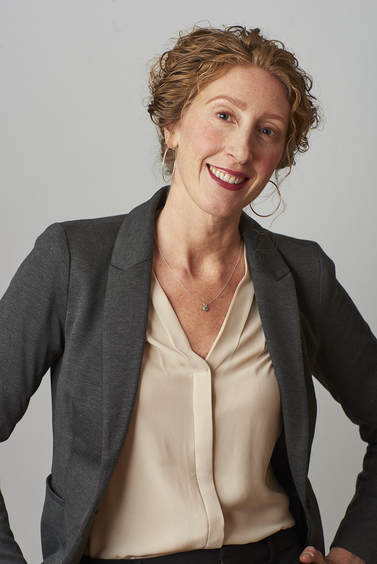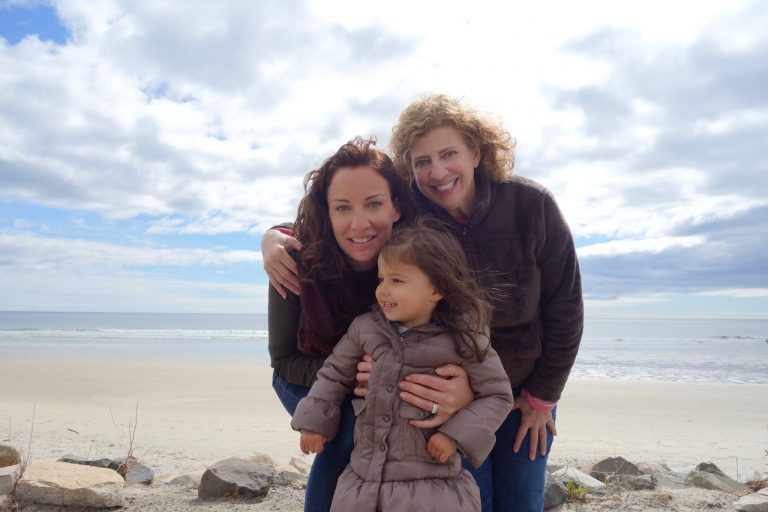|
Millions of women suffer from postpartum depression, yet an overwhelming majority of them do not receive the care they so desperately need. A couple of the key factors are lack of awareness and the unfortunate stigma that surrounds maternal mental illness. One woman who has devoted herself to tackling this very issue and to giving the much needed help to those suffering is Paige Bellenbaum, the Program Director at The Motherhood Center in Manhattan. Her intimate battle has led her to educate, screen and treat others for postpartum depression (PPD).
SSP: It's truly an honor to interview someone so deeply committed to helping women with postpartum depression, and making sure this serious condition is getting the attention it deserves. Can you please tell us a little about yourself, and how you became such a critical advocate for the cause? 11 years ago, I suffered from severe postpartum depression and anxiety after the birth of my son, Max. In retrospect, my anxiety started early on in the pregnancy, but not having been pregnant before, I didn't know what was "normal." During pregnancy I was constantly worried that something was wrong with him, if he wasn't moving I imagined the worst, I thought that it was impossible for him to be born OK. Immediately after a physically and emotionally traumatic birth, I wanted to be left alone and sleep for a year. When they put him on my chest to hold for the first time, I didn't feel anything - no connection - nothing. As the days and weeks went on, my anxiety skyrocketed. I had milk supply issues, he was losing weight, I was convinced still something horrible was going to happen to him. He wasn't eating enough, he was sleeping too much, I worried about EVERYTHING. The anxiety kept me up at night, I couldn't sleep even when he was asleep because I was ruminating about all the things that I thought were wrong or could go wrong, and soon I found myself in a deep dark spiral of depression. I felt that I had made the biggest mistake of my life. I was hopeless, helpless, and felt totally alone. I didn't like Max at all, I wished I had never had him. I would fantasize about buying a one way ticket far away and never coming back - because surely he and my husband would be better off without me. It got worse - I then began to fantasize about how I might take my own life and relieve them both of my failure as a mother. One day I was walking Max outside in the stroller - it was the first time I had been out with him in weeks. As we approached the corner, a bus was driving down the street and in that moment - it was all I could do not to throw us both in front of the bus and end it all. And it was at that moment I knew I needed help - and fast. I hopped in a cab and went to a psychiatric clinic. I started therapy and went on medication and slowly but surely, I got better and started to love my son. When I got better, I found myself extremely angry that for 6 months I was in this state and never did anyone say to me - "You have postpartum depression, it's common, and it's treatable and here is where you go for treatment." Nobody was talking about it although the more I shared with other mothers that I felt miserable, the more they said "me too." I began to research local and state policies addressing postpartum depression and drafted a model bill for New York State. I took it to a dear friend of mine who was a State Senator and said "This is my story, it happened to me and so many other women and it doesn't have to be like this - let's change it." After 4 years of numerous roundtables and revisions, the bill was signed into law in 2014, strongly encouraging screening for all pregnant and new mothers and requiring literature be given to women before they are discharged from the hospital explaining the difference between baby blues and PPD as well as providing local treatment resources. For a few years after that, I went on a public awareness rampage, sharing my story with any reporter, journalist, policy maker or person that would listen. I used it as a tool for change. In the Winter of 2015, I shared my story at a press conference with the Mayor's wife who was unveiling a huge mental health package for New York City, and one of the initiatives was screening for postpartum depression. When I exited the stage, I was approached by a friend and colleague, Dr. Catherine Birndorf, and her business partner Billy Ingram. She stared to tell me about this exciting new program they were starting to treat women with PPD and ask if I would I like to join the team. I couldn't say no - it was a dream come true- and fast forward to the one year anniversary of The Motherhood Center! SSP: As Program Director of the Motherhood Center, can you inform us about the services you offer to new and expecting moms? At The Motherhood Center, we provide multiple levels of clinical treatment for pregnant and new mothers suffering from perinatal mood and anxiety disorders (PMADs) otherwise known as postpartum depression. This includes anxiety, depression, OCD, PTSD, psychosis and bipolar disorder - all during the perinatal period. For women struggling with acute symptoms, who are really having a hard time making it through the day and caring for their baby, we have a day program. The day program is for 5 hours a day, with an on site nursery for babies. We offer therapeutic support groups, expressive therapies like yoga, meditation and art therapy, individual therapy, dyadic therapy and medication management with our Reproductive Psychiatrists. For women that have more mild to moderate symptoms, we offer outpatient therapy and medication management, and support groups. We also have a partners group to offer support to dad's and partners. And finally we have a whole host of classes and education for all pregnant and expecting parents ranging from childbirth education, newborn care, infant CPR, breastfeeding support and more. SSP: Do you have a certain method or approach to counseling and the treatment plan you follow? At The Motherhood Center, we use a number of empirically proven best therapeutic practices including Cognitive Behavioral Therapy, Dialectical Behavioral Therapy and Interpersonal Therapy. We also use non-traditional modalities as well including mindfulness and meditation, art therapy, yoga and more. SSP: There is a certain stigma with maternal mental illness. Why do you think this is so, and why do so many cases go misdiagnosed or undiagnosed? Sadly, in our society there is enormous stigma around mental health period, let alone maternal mental health. When it comes to becoming a mother, everywhere you look are beautiful pictures of mommies and babies on pampers ads, smiling, happy, in love. Nowhere do we see pictures or ads of sleep deprived new moms that may not have had time to take a shower in a few days, or of babies projectile vomiting, or breast milk leaking through a woman’s shirt after being hooked up to a pump for what feels like forever. The dearth of these less than desirable yet truthful images of motherhood make many new mothers feel like they are doing a horrible job because they aren’t living the story they see on the pampers ad. And if you throw in anxiety or depression to the mix, including scary or intrusive thoughts or feelings of hopelessness, it’s incredibly hard to share this sense of failure with anyone. New and expecting moms feel an enormous sense of guilt and fear of judgement. And in extreme cases, as we saw recently with the story of Jessica Porten, she told a nurse she was suffering from postpartum depression, and they called the police on her: http://www.scarymommy.com/jessica-porten-facebook-postpartum-depression/ There is a real fear that if a woman tells the truth about how she feels, she will have her baby taken away. In many instances, when a pregnant or new mother is screened for depression at an OBGYN or pediatric visit, she will not answer the questions honestly out of fear and shame. Research suggests that 1 in 5 women suffer from a perinatal mood and anxiety disorder. Those of us who do this work know that the number is closer to 1 in 3 due to the stigma. SSP: I think many of us characterize symptoms as an overall feeling of sadness, but I understand there are other symptoms that are often overlooked. What are the warning signs we should be looking for? Depression and anxiety in the Perinatal period can look very different than generalized anxiety and depression that appears at other times in a woman’s life. Some common symptoms for a pregnant or new mother include: - irritability and rage - inability to sleep or stay asleep - decrease in appetite - scary or intrusive thoughts of harm coming to the baby - helplessness and hopelessness - catastrophizing or jumping to conclusions SSP: How incredible, to give hope and offer support to all of these women who so desperately need it. You are literally saving lives. Do you have one case or story that you can share, which impacted you greatly? One story that will stand out forever is the story of one of our very first patients in the Day Program. As a brand new mother, she first came to us as a potential outpatient client, but we quickly realized her symptoms were more acute and she needed a higher level of care. She herself was a psychiatrist running a fast paced psychiatric ER department. She presented with anxiety and depression which escalated rapidly. She would walk up and down the halls of The Motherhood Center asking everyone when she was going to get better. She was convinced the answer was “never” and that she was the exception to the rule. Despite our best efforts, her symptoms became more intense and led to an inpatient hospital stay. She returned to us after her hospitalization, and ever so gradually we noticed improvement. Today she is 100% better, she went back to work and got promoted. From time to time she comes back to speak to patients that are currently in the day program to share her story and provide hope that with treatment, everyone gets better. SSP: How can we, as parents, be the best advocates we can be for those suffering from PPD and related illnesses? If you are a pregnant or new mother, and are suffering from any of these symptoms, reach out to The Motherhood Center at 212-335-0034 or visit us to learn more at: www.themotherhoodcenter.com. We will conduct a brief phone screen to assess your symptoms and get you in as quickly as possible for an evaluation to determine your best course of treatment. If you suspect someone you know might be suffering, asking the simple question “How are YOU doing?” can sometimes be all it takes for a new mom to open up and tell you how she is feeling. Normalize her feelings, tell her how common it is to have them, and let her know what we tell everyone who walks through our door, with treatment - everyone gets better.
0 Comments
Leave a Reply. |
Jen Valu
|



 RSS Feed
RSS Feed




